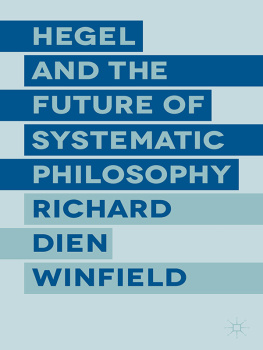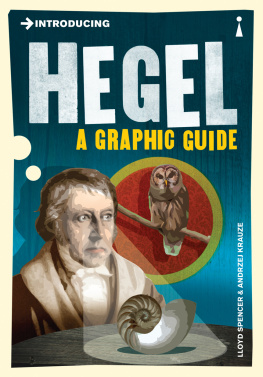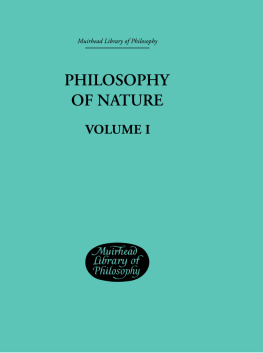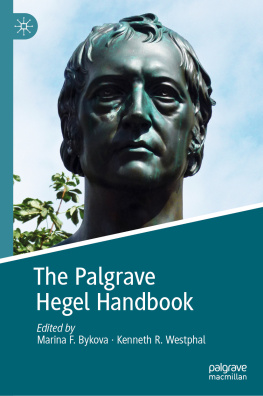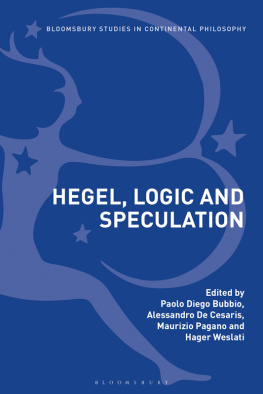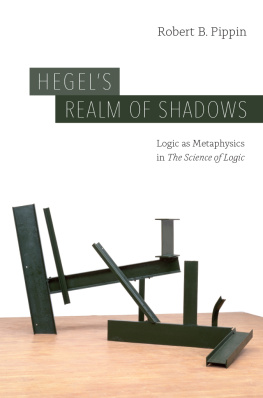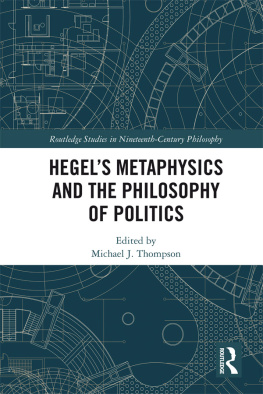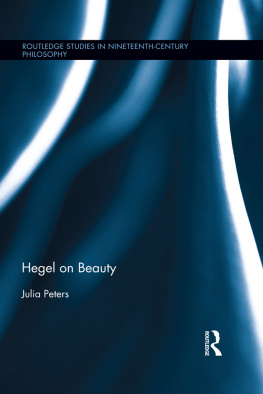Hegel and the Future of Systematic Philosophy
Also by Richard Dien Winfield
AUTONOMY AND NORMATIVITY:
Investigations of Truth, Right and Beauty (2001)
FREEDOM AND MODERNITY (1991)
FROM CONCEPT TO OBJECTIVITY:
Thinking Through Hegels Subjective Logic (2006)
HEGEL AND MIND:
Rethinking Philosophical Psychology (2010)
HEGELS PHENOMENOLOGY OF SPIRIT:
A Critical Rethinking in Seventeen Lectures (2013)
HEGELS SCIENCE OF LOGIC:
A Critical Rethinking in Thirty Lectures (2012)
LAW IN CIVIL SOCIETY (1995)
MODERNITY, RELIGION, AND THE WAR ON TERROR (2007)
OVERCOMING FOUNDATIONS:
Studies in Systematic Philosophy (1989)
THE JUST ECONOMY (1988)
THE JUST FAMILY (1998)
THE JUST STATE:
Rethinking Self-Government (2005)
THE LIVING MIND:
From Psyche to Consciousness (2011)
REASON AND JUSTICE (1988)
STYLISTICS:
Rethinking the Artforms after Hegel (1996)
SYSTEMATIC AESTHETICS (1995)
Hegel and the Future of Systematic Philosophy
Richard Dien Winfield
Distinguished Research Professor,
University of Georgia, USA


Richard Dien Winfield 2014
All rights reserved. No reproduction, copy or transmission of this publication may be made without written permission.
No portion of this publication may be reproduced, copied or transmitted save with written permission or in accordance with the provisions of the Copyright, Designs and Patents Act 1988, or under the terms of any licence permitting limited copying issued by the Copyright Licensing Agency, Saffron House, 610 Kirby Street, London EC1N 8TS.
Any person who does any unauthorized act in relation to this publication may be liable to criminal prosecution and civil claims for damages.
The author has asserted his right to be identified as the author of this work in accordance with the Copyright, Designs and Patents Act 1988.
First published 2014 by
PALGRAVE MACMILLAN
Palgrave Macmillan in the UK is an imprint of Macmillan Publishers Limited, registered in England, company number 785998, of Houndmills, Basingstoke, Hampshire RG21 6XS.
Palgrave Macmillan in the US is a division of St Martins Press LLC, 175 Fifth Avenue, New York, NY 10010.
Palgrave Macmillan is the global academic imprint of the above companies and has companies and representatives throughout the world.
Palgrave and Macmillan are registered trademarks in the United States, the United Kingdom, Europe and other countries
ISBN: 9781137442376
This book is printed on paper suitable for recycling and made from fully managed and sustained forest sources. Logging, pulping and manufacturing processes are expected to conform to the environmental regulations of the country of origin.
A catalogue record for this book is available from the British Library.
A catalog record for this book is available from the Library of Congress.
In memory of my mother-in-law, Kusum Gupta (19352014)
Contents
Acknowledgments
The following chapters incorporate text that was previously published and/or delivered at conference meetings.
incorporates text published as Is Phenomenology Necessary as Introduction to Philosophy?, Review of Metaphysics, December 2011, LXV, no. 2, issue 258: 119.
incorporates text delivered at the Metaphysical Society of America Annual Meeting, Boston, March 6, 2010, and published as Negation and Truth, Review of Metaphysics, December 2010, LXIV, no. 2, issue 254: 27389.
incorporates text delivered at the Society for Systematic Philosophy group meeting, APA Pacific Division Meeting, San Francisco, April 6, 2007, and published as How Should Essence Be Determined? Reflections on Hegels Two Divergent Accounts, International Philosophical Quarterly 48, no. 2, issue 190 (June 2008): 18799.
incorporates text delivered at the 30th International Hegel Congress, Vienna, April 25, 2014.
incorporates text delivered at the Metaphysical Society of America Annual Meeting, Athens, Georgia, March 11, 2012, and published as The Objectivity of Thought: A Hegelian Meditation, Philosophical Forum, Winter 2013: 32939.
incorporates text delivered at the Metaphysical Society of America Annual Meeting, Holy Cross University, Worcester, MA, April 13, 2013, and published as Truth, the Good, and the Unity of Theory and Practice, Review of Metaphysics, December 2013: 40522.
incorporates text delivered at the Society for Systematic Philosophy group meeting, American Philosophical Association Eastern Division Meeting, New York City, December 28, 2009, and published as The End of Logic, Idealistic Studies 41, no. 3, Fall 2011: 13548.
incorporates text delivered at the Society for Systematic Philosophy group meeting, American Philosophical Association Central Division Meeting, Chicago, February 16, 2012, and published as The Logic of Nature, Journal of Speculative Philosophy 27, no. 2, 2013: 17287.
dellIntersoggettivit nella Filosofia Hegeliana dello Spirito Soggettivo, in G. Rinaldi, ed., Il pensiero di Hegel nellEt della globalizzazione (Rome: Aracne, 2012), pp. 20321.
incorporates text delivered at the 22nd Biennial Meeting of the Hegel Society of America, DePaul University, Chicago, October 27, 2012, and published as Economy and Ethical Community, in Hegel and Capitalism (Albany: SUNY Press, forthcoming).
incorporates text published as The Challenge of Political Right, Bulletin of the Hegel Society of Great Britain, no. 65, 2012: 6174.
incorporates text delivered at the International Conference on Hegels Thought in the Age of Globalization, University of Urbino, Italy, June 4, 2010, and published in Italian translation as La Normativit della Globalizzazione, in G. Rinaldi, ed., Il pensiero di Hegel nellEt della globalizzazione (Rome: Aracne, 2012), pp. 28199.
incorporates text published as Literary Form and Civilization, in Literature and Philosophy: Essaying Connections, ed. Supriya Chaudhuri (Calcutta: Papyrus, 2006), pp. 4662.
I thank the editors, journals, and publishers listed above for their permissions.
Introduction
The Enlightenment enjoins us to question given dogma and tradition and think for ourselves. It summons us to advance the autonomy of reason and achieve emancipation in all spheres of life. In embracing freedom of thought, action, and artistic creativity, the Enlightenment has sought, however, to provide foundations for autonomy. Reason has been subjected to a critique seeking to determine the conditions of objective knowledge. The legitimacy of institutions of freedom has been grounded in natural principles of liberty through social contract and other privileged procedures of construction. The autonomy of beauty has been rooted in privileged forms of reception. In all of these efforts, what should be self-determined is grounded upon some antecedent foundation. As a result, the autonomy of reason, conduct, and fine art is left founded upon privileged factors whose own authority is open to question. Instead of being genuinely self-determined, autonomy is reduced to something determined by something else. The project of the Enlightenment cannot succeed on these, its own terms.
Most post-Enlightenment thought has rejected the ideals of the Enlightenment by embracing the Enlightenments fundamental assumption, that freedom has foundations. Accepting this presupposition, these critics of the Enlightenment have set about unmasking reason, conduct, and beauty as impostors whose celebrated autonomy is actually conditioned by particular factors whose privileged role is arbitrary. What these critics have failed to acknowledge is that their deconstruction of the Enlightenment project undermines the authority of their own diagnosis. By accepting that reason, conduct, and fine art are always rooted in contingent foundations, the would-be grave diggers of the Enlightenment should admit that nothing they think, do, or create has any universal binding normativity but is instead a conditioned effort relative to the contingent foundations on which it rests.
Next page
